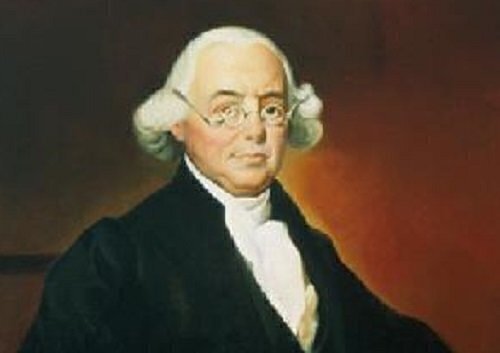 |
| The Hon. James Wilson of Pennsylvania, who is credited with the creation of the Electoral College. He's the one to blame! Photo Courtesy: ConstitutionalCenter.org |
Editor's Note: Our own Nat Paul takes a deep dive into the Electoral College and why it exists - this is the first of a three-part series
The Electoral College has become a contentious topic in recent political discourse. Some commentators ardently defend it as an important political tradition and safeguard against mob rule. Others oppose it with equal conviction, calling it undemocratic and obsolete.
But let's be honest: most non-partisans either love or hate the institution solely because it made their preferred candidate win or lose the latest election.
But how did the Electoral College come to exist in the first place? What compromises between political opponents in the late 18th Century led to its creation? Why didn’t the Founding Fathers institute a more democratic electoral system? These questions and others demand answers, if we are to accurately appraise its value in modern American politics.
But let's be honest: most non-partisans either love or hate the institution solely because it made their preferred candidate win or lose the latest election.
But how did the Electoral College come to exist in the first place? What compromises between political opponents in the late 18th Century led to its creation? Why didn’t the Founding Fathers institute a more democratic electoral system? These questions and others demand answers, if we are to accurately appraise its value in modern American politics.
The Electoral College's Origins
In the 1780s, the future of the United States was far from certain: any of the states could easily push for solitary independence if the terms of the Constitution were unacceptable. By granting one Elector for each Congressman and Senator representing a state, the Constitution bestowed a disproportionate advantage upon the smaller states, while the giants of the time (New York and Virginia) still maintained the most electoral clout. This elite-friendly system of election ensured for the meantime that the Union would form.
Like much of the Constitution, the Electoral College is a product of compromise. The delegates at the Constitutional Convention sought to balance the interests of slave states vs. free states, agricultural states vs. mercantile states, and large states vs. small states. This dynamic manifested itself in Congressional politics in the 3/5 Compromise and creation of the bicameral legislature with equal Senate representation and population-based House representation. In Presidential politics, it took the form of the Electoral College. The resultant system was considered optimal by none, but acceptable by all.
What Happened To "Democracy"?
The decidedly undemocratic "democracy" of the Electoral College can be explained by highlighting two key limitations of the Founding Fathers’ circumstances.
The first is the rate of communication of their era. With the telegraph and internal combustion engine decades away from invention, all news had to be carried in person on horseback. This limitation made timely voting impractical, especially in rural areas. It also meant that pertinent news might not reach many voters until after they had already voted. Obviously, those problems don't exist today. with the omnipresence of mass media, instantaneous global communication, and availability of high speed internet.
The first is the rate of communication of their era. With the telegraph and internal combustion engine decades away from invention, all news had to be carried in person on horseback. This limitation made timely voting impractical, especially in rural areas. It also meant that pertinent news might not reach many voters until after they had already voted. Obviously, those problems don't exist today. with the omnipresence of mass media, instantaneous global communication, and availability of high speed internet.
The second limitation was that of education. While the elites in every state were often highly educated, the average American at the time was lucky to complete elementary school. Literacy rates were also shockingly low in many parts of the country, further limiting the average American’s ability to vote. The average American at the time did not have the means to inform himself adequately in order to vote "responsibly." In light of this obstacle, the Founders decided that the best alternative was to have someone knowledgeable vote on behalf of the benighted masses. While education remains a challenge to be solved by today's leaders, The obstacle pales in comparison to what has since been overcome by the extension of public education and literacy to nearly-universal levels in America.
These details of the Electoral College’s origins are as crucial to understanding the institution’s future as they are to understanding its past. The Electoral College was not a perfect system bestowed upon the Founding Fathers by God Almighty: it was an ingenious work of compromise that reflected the political realities of its time. The Founders’ concerns over the dangers of democracy were equally ideological and logistical in nature. This foundation established, one can intelligently study the system’s evolution over the ensuing two centuries of American politics.
Part 2 - Next Week!
Part 2 - Next Week!


















0 comments:
Post a Comment
Note: Only a member of this blog may post a comment.